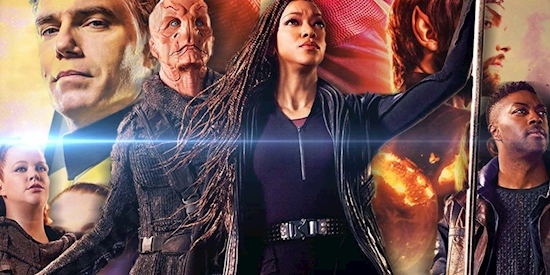Star Trek: Discovery Brought Back Some Major TNG Era Diplomacy
WARNING: The following contains spoilers for Star Trek: DiscoverySeason 3, Episode 3, "People of Earth," now streaming on CBS All Access.
Star Trek: Discovery's third season has taken the show into uncharted territory for both the crew and the franchise. The show is no stranger to making bold narrative choices, some upsetting hardcore fans. Sending the crew centuries forward and presenting them with a future without Starfleet seemed like another risky move at first glance, but somehow, this bleak future has allowed Discovery to find its footing. This point is made even more clear in "People of Earth," when the crew of Discovery was able to pull off a bit of The Next Generation era diplomacy.
Click the button below to start this article in quick view. Start nowDiscovery has struggled with tone since it began. Many have critiqued how dark and violent Season 1 was, first following the Klingon war then Captain Lorca's betrayal and the mirror universe plot. It felt out of sync and disconnected from the original Trek, which Discovery was set 10 years before. Season 2 then had the difficult task of making Discovery line up better with established Trek lore, which, against all odds, it was able to pull off.
Season 2 relied on using established characters, though, bringing the Enterprise in and having then-Captain Pike take command of the Discovery. It also leaned heavily on connections to previous Trek entries, even including more controversial addition like the morally bankrupt rogue division of Starfleet, Section 31. While an overall improvement and definitely more in-line with the franchise, it did this by focusing on what other shows had started.
In Season 3, the bold decision to permanently send the Discovery into the future, further than Star Trek has ever gone, was the first to truly take the series into new territory. By distancing the crew and audience so far from what they've known, to a time where Starfleet is falling into myth, the show has managed to highlight what makes the dream of the Federation so special. The crew has found themselves with its most concrete mission yet: reunite Starfleet and reignite hope in the galaxy. Because they are now mostly alone, the Discovery is clinging harder than ever to the ideals that make up the core of their identity. Though this future is certainly bleak, it's not lost, and the integrity the crew is showing in the face of these unbelievable circumstances has felt perfectly in-line with Starfleet.
Their work to restore the ideals of the Federation surprisingly started at home. Upon returning to Earth, they discovered that the entire solar system had left the Federation after the Burn. Safe, but overtly hostile out of reflex, Earth has been fighting off raiders from the nearby colony of Saturn's moon, Titan. Earth had to fight hard to keep humanity safe after the Burn, but the colonists on Titan weren't fearsome marauders, they were impoverished and desperate.
The crew of the Discovery found themselves in a classic diplomatic conflict between two foes with sympathetic motivations. It was very evocative of TNG, where Captain Picard would often prevent bloodshed with sincere pleas for a willingness to listen. In true Trek fashion, viewers were forced to see both sides' perspectives. Fortunately, the crew was able to open dialog between supposed enemies and allowed reason to prevail.
Season 3 has revolved around finding hope in the darkness. Against all odds, going to this bleak future has allowed Discovery to feel more like a proper Trek show than ever. The handling of the Earth and Titan dispute nailed home the Federation's ethos of finding peaceful solutions through communication. Hopefully, this season will continue to press the importance of the Federation's ideals and integrity.
About The AuthorSource: www.cbr.com

